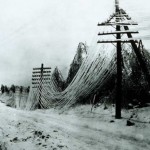 The decision of Madam Justice Wailan Low in Ondrade v. Toronto (City) provides a useful review of the law relating to the liability of municipal corporations for “slip and fall” accidents that take place during severe winter weather.
The decision of Madam Justice Wailan Low in Ondrade v. Toronto (City) provides a useful review of the law relating to the liability of municipal corporations for “slip and fall” accidents that take place during severe winter weather.
The plaintiff had slipped and broken his wrist during a storm that struck Toronto on February 22 and 23, 2003. As described by Her Honour, “[o]ver the course of less than 48 hours, the City experienced snow, ice pellets, rain and freezing rain. Weather statistics kept for Toronto Pearson and Toronto Islands indicate that the temperature fluctuated from 2.4 degrees Celsius to minus 9.3 degrees Celsius. There was blowing and drifting snow. There was a total of 28 cm of precipitation, with 25.2 cm on the 22nd and 2.8 cm on the 23rd.”
Under s. 44(1) of the Municipal Act, the City had an obligation to keep the highway “in a state of repair that is reasonable in the circumstances”.
Section 44(3)(b) of the Act provides a defence to a municipality if it took reasonable steps to prevent the default from arising.
Justice Low found that the City of Toronto had met the duty imposed by s. 44(1) and that in any event, it had also made out the defence under s. 44(3)(b).
In her reasons, Justice Low detailed the measures taken by City staff to combat this storm. She laid heavy emphasis on the ever-changing nature of winter weather in Canada and the limits on what can be done about it. The following passage from her reasons is particularly colourful:
Unlike sinkholes or upheaved paving which are static and merely await human intervention, road conditions produced by winter storms are definitionally in a state of flux and can turn from safe to treacherous in a matter of minutes. Road conditions may worsen even as workers apply their tools and ingenuity to make them safe and passable. One of the witnesses called by the City spoke of getting ready to fight the storm: it no doubt builds morale for the maintenance teams to speak in terms of fighting a battle, but realistically, there is no contest. Nature is the dominant player; its force is stronger, faster and more virulent than man’s ingenuity can control or contain. When winter weather is at the ramparts, there is no turning it back.
The decision makes it clear that in order to establish liability under s. 44(1) of the Municipal Act, it will not be enough to show that the City could have done more or could have done something different, because this will always be the case. The issue is whether the City has met what Her Honour called “the flexible standard of a state of repair that is reasonable in the circumstances”. Here, the City of Toronto satisfied that test.
